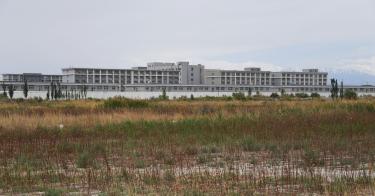Tashpolat Tiyip, a distinguished Uighur scholar of geography, may face imminent death unless the U.S. government jumps in.
Vanished in 2017 after he was detained on his way to a conference in Germany, Tiyip was reportedly given a secret trial and sentenced in September 2017 to a suspended death sentence, along with five other members of the Xinjiang Education Supervision Bureau.
The two-year mark of his suspended death sentence came and went in September and, thankfully, it is believed he has not yet been executed. But his execution could happen any day now.
Given the severity of the ongoing crisis in Xinjiang—an estimated 1 million or more minority Muslim Uighurs are held by the Chinese government in political re-education facilities today—the U.S. has a responsibility to act.
Secretary of State Mike Pompeo, who has called consistently for the release of all those arbitrarily detained in Xinjiang, should press now, along with others in the administration, for the release of Tiyip and all those detained in Xinjiang.
Tiyip was a professor in the geography department at Xinjiang University and in 2010 became president of the school. As was required, he was a member of the Chinese Communist Party.
Before his apprehension, Tiyip was respected as a model of how Uighurs could succeed within the Chinese system and even acknowledged by Chinese state media as a “model minority leader.”
How did the “model minority leader” fall from grace?
According to reports, Tiyip was sentenced to death because the Chinese government suspected he was a separatist.
The promotion of separatism is a non-starter in China, whose government prizes sovereignty as one of its primary foreign and domestic policy priorities (the other being the continued rule of the Chinese Communist Party).
Those who knew Tiyip say accusations of separatism are false. It’s more likely that Tiyip’s high-profile academic status and myriad travels abroad made him a prime target in the midst of the Chinese government’s broader crackdown on Uighurs.
The exact details of how and why he was apprehended are largely unknown given that the trial was secret.
Tiyip’s targeting comports with a broader trend. Some of the first targets of China’s efforts to collectivize and arbitrarily detain Uighurs in Xinjiang were Uighur students studying abroad, Uighurs living abroad, or Uighurs with family living abroad.
Many were lured back to Xinjiang—with threats levied against their families if they did not return—only to be arbitrarily detained in the estimated 143 camps where there are reports of torture, self-criticism sessions, and even limited reports of death in the camps.
Former detainees confirm these abuses and others. There are even reports of forced sterilization of Uighur women to control Uighur population growth.
Tiyip’s situation, and the situation of the million or more Uighurs currently held in detention, merits action.
A Heritage Foundation report outlines next steps the U.S. government should take to respond to the crisis in Xinjiang. In addition to calling for the release of all those arbitrarily detained, the report recommends sanctioning known Chinese individuals and entities responsible for violating human rights in Xinjiang under Treasury’s Global Magnitsky Act authorities, among other solutions.
The Trump administration has taken incremental steps in the right direction to respond to human rights violations in Xinjiang. It has restricted visas on Chinese officials responsible for the crisis in Xinjiang. Yet more can be done.
Given the scale and scope of the crisis, the U.S. must consider financial sanctions against Chinese officials and call upon the Chinese government to do the right thing by releasing all those arbitrarily detained in Xinjiang.
The U.S. government can build momentum for such action by raising the profile of Tiyip’s case before it is too late.
This piece originally appeared in The Daily Signal



